By process of elimination, if your situation is neither of those above, you probably want 'their.' You've tipped the odds of a guess in your favor by using the two tests above.
But, to be thorough: Their -- shows possession. If something (an object, an idea...whatever) is owned or held by a group of two or more people that doesn't include you, describe it as theirs. The test here would be if you were talking about a group that DID include you, could you replace 'their' in the sentence with 'our' and it would still make sense? If so, 'their' is the choice you want. Example: Marsha, Jan and Cindy usually sided with their mom when there was a disagreement with the men in the house. If you imagine for a minute that you are Cindy, the sentence would make sense reading, "Marsha, Jan and I usually sided with our mom when there was...." This is a slightly more complicated test, but not really difficult once you make a habit of stopping to check that you've chosen the correct homophone (words that sound the same) when writing there/their/they're.
0 Comments
We've run in to this one a lot, lately, in the form of "inputed" and "casted"/"forecasted."
Most of the time, when the past and present versions of a verb are the same, it presents no difficulties: "hit" and "put" and "shed" seem to do just fine in the hands of nearly everyone. But there's something "input" and variously prefixed forms of "cast" that are causing people grief. So, for example: "He put his keys in his pocket and turned away." (past tense) "I usually put my keys in my right pocket." (present tense) and "The players shed their warm-ups and hit the field, while Coach looked over her notes." (past tense) "It's time to shed the winter colors and get ready for spring -- let's hit the mall!" (present tense) equally: "He forecast a rain/snow mix, but in the end, we got all rain." (past tense) "I forecast mostly sunny for the next several days." (present tense) and "The research assistant input the data last week, so we can run the analyses now." (past tense) "The system is waiting for me to input instructions so the next routine can start." (present tense) No different. 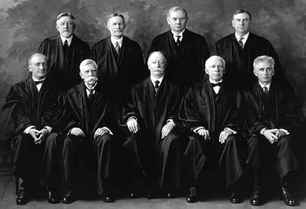 It has lately come to the Writers' and Polishers' attentions that we have not yet explained the difference between 'comprise' and 'compose.' There are some nuances (aren't there always?), but in brief, there are two things you need to know:
Now you need never again be confused by this oft-confounding pair of words! 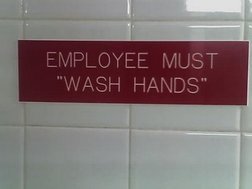 We'll start with the primary jobs for which quotation marks are excellent: The obvious one is when presenting an exact quotation -- "To be or not to be," is one of the most famous lines ever written. When a quote falls within a quote, single marks are used for the inner statement -- He told her, "be careful, or I might have to go all, 'Frankly, my dear, I don't give a damn!'" In this context, quotation marks are used in writing dialogue. The trouble with quotation marks, as in the photographs here, comes with their use to indicate euphemism, irony or sarcasm. Instead of quotation marks, one could use words like "supposedly" or "so-called" -- as in, She was "feeling ill" and left early versus She was supposedly feeling ill, and left early You can appreciate the similarity, while the first one is probably a more effective statement of the dubiousness with which the speaker/writer views the claim of illness.  Which brings us back to the problem at hand. We frequently encounter the clear error of using quotation marks to indicate emphasis -- often with slightly comedic (or disconcerting) results. We're not quite certain how this situation has grown to epidemic proportions, but it has. To emphasize a word or statement (often a rule, regulation or command), one has quite a few tools in the typographical arsenal: italics, boldface, underlining, ALL CAPITALS or ANY COMBINATION of the foregoing. So, there is no shortage of options. Re-purposing of quotation marks to create another one is not only wrong, it's unnecessary. Though the intended meaning in a statement containing errant quotation marks is understood, the essence result suggests the opposite. 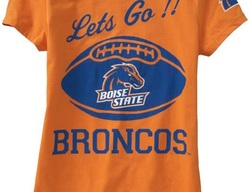 While conducting other business on the Internet, we came across a new subject for our Facebook rogues' gallery of language error and/or misuse. Click on the picture to see the details of the situation -- though the CliffNotes version is that Old Navy shipped and sold these shirts without a necessary apostrophe in "Let's Go!!" Retail goods and client-facing communication material need to be checked for these basic (and embarrassing) errors. Contact us to discuss your needs.  Check out this great piece, "8 words that may not mean what you think they mean." For the record, we concur with article author Laura Hale Brockway's directive to stop what you're doing and see this movie (The Princess Bride) immediately if you have not previously. That said, we have never been able to find what is incorrect in Vizzini's use of "inconcievable." Webster's give the definition as "impossible to comprehend." Contextually, it's just fine. That nitpick does not, in any way, detract from our enjoyment of this story! 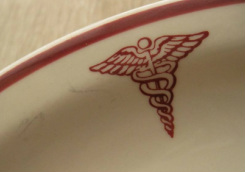 We have encountered this twice in recent weeks -- either a straight-up error, or the result of auto-correct undermining the writer's meaning: the acronym AIDS rendered as "Aids." One instance was in looking over a fundraising piece, the other when reviewing a medical information form from a dentist's office. All of the healthcare fields, and a few of the charitable/non-profit ones, need to be on the lookout for this specific error. Auto-correct saves us from a lot of mistakes...but opens up whole new possibilities for embarrassment. If there are acronyms that you use regularly in your line of work, make a Ctrl+F review of them part of your standard editing/revision process, in order to ensure that they are all properly capitalized. When abbreviating a multi-word name, the capitals are retained, partly as a clue that the resulting "word" stands for something else. "AIDS" represents the the term "Acquired Immune Deficiency Syndrome." Hence, must always be given in caps. Bonus: Both "HIV," the Human Immunodeficiency Virus (that causes AIDS) and "AIDS" are abbreviations. However, AIDS is also an acronym, as the abbreviation creates a name that is read as a word. The alternative would be to refer to AIDS by its individual letters, as the disease ay-eye-dee-ess. Whether or not an abbreviation is used as an acronym is not always obvious. The initial letters of the World Health Organization (WHO) creates a readable word, but the agency does not go by "the WHO (hoo)," as it could create confusion with the band of the same name. Ergo, even though it could be an acronym, it isn't used as such. So, CIA (Central Intelligence Agency), IRS (Internal Revenue Service), BBC (British Broadcasting Corporation) and IRA (Irish Republican Army) are abbreviations. NASA (National Aeronautics and Space Administration), NATO (North Atlantic Treaty Organization) and IRA (Individual Retirement Account) are abbreviations that are also acronyms. For vastly more on this topic, visit Wikipedia. 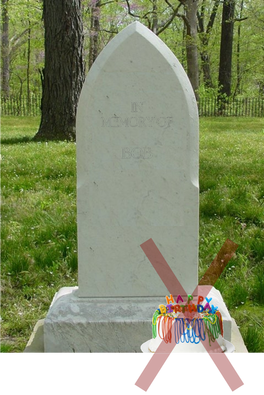 We see this all the time -- continuing to accumulate birthdays to those who have passed on. Though our fortieth President, Ronald Reagan, ceased to be in 2004, his "100th birthday" was observed last year. Werner von Braun expired in 1977, but still, last month, his "100th birthday" was noted. As predicted by Bill Murray's character in Stripes, Tito Puente is now dead. And though you may HAVE been listening to him for years, and he WAS (and through his recordings, still is) fabulous, he joined the choir -- er, in this case, the Latin jazz band -- invisible in 2000. Still, we encountered a reference to his birthday today. Only the living continue to age, as reflected by the increasing number of birthdays they have had. A far more correct and appropriate phraseology is, "in memory of Great-Aunt Eliza on the 100th anniversary of her birth...." Or, you may feel free to "reflect on the accomplishments of the late Ezekiel Helmsworth-Cummings on the 85th anniversary of his birth." Bonus: we dedicate things to the living using the phrase, "in honor of" and to the deceased with, "in memory of." Supplemental Bonus: enjoy the Monty Python "Dead Parrot" sketch here.  We had cause to wonder recently if people who pronounce that strong coffee drink as "expresso," also spell it that way.... They might not -- sometimes we do say things differently than we spell them (people and language both being complex!!) Either way, our advice is to try to be conscious of differences in what you hear from one person to another, and then investigate why those differences exist. You may just discover that something you thought was right isn't, and improve your own communication skills as a result! 10/7/2011 0 Comments For Grammar Nerd Emergencies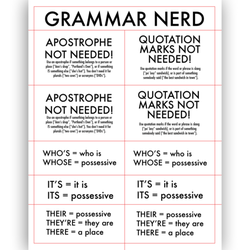 Be still, my beating heart! An order shall be placed forthwith, that the Write-and-Polish-mobile (and briefcase, and pen wrangling thingie) will be stocked when faced with a grammar emergency in public places! If those within the reach of our keyboard have trouble with any (or several) of these grammatical situations, acquire a sheet, laminate it and use it as a place mat, that you may have the answers always at the ready. |
Write and Polish BloggersChristie Manussier, principal Writer and Polisher, is the usual news reporter. CategoriesAll Abbreviation Academic Acronym Adjective Adverb Anachronism Anagram Apostrophe Application Article Banished Biography Blend B.N.I. Boldface Brochure Bunnies Business Business Plan Capitalization Children's Literature Christmas Church Comma Common Mistakes Construction Contact Management Content Contest Cross-sell Databse Differentiators Donation Double Negative E-mail Entertainment Etymology Event Coordination File Format First Reference Flyer Fundraiser Giggles Gold Star Grammar Day Grant Proposal Haiku Health Care Homophones Hyphen Idiom Images Italics Law Firm Magazine Manual Marketing Maternity Leave Metaphor Myth News & Announcements Newsletter Non Profit Non-profit Noun Numbers Of Snakes And Presidents Parts Of Speech P.D.F. Plural Poetry Portmanteau Poster Powerpoint P.R. Preposition Press Release Projects Pronoun Proofreading & Editing Punctuation Quotation Marks Quotes Real Estate Recommended Reading Reflexive Research Resources Restaurant Retail R.F.P. R.I.P. Shakespeare Slideshow Social Media Spelling Style Manual Synonyms Syntax Template Tenses Testimonial Thesaurus Training Manual Translation Travel Twitter Underlining Verb Video Vocabulary Website Why The World Needs More Proofreaders Winter Word Of The Day Writers Writing Tip Archives
March 2015
|
Search by typing & pressing enter


 RSS Feed
RSS Feed